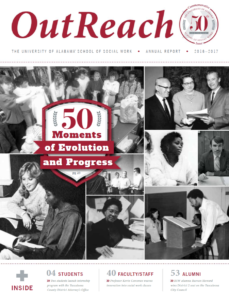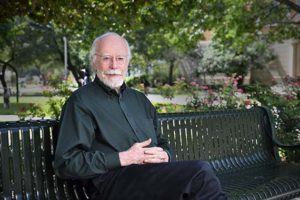Where to Retire

Rick Hughes isn’t ready to retire quite yet. But when the real estate agent and his wife sought a place to relocate, they chose a city with all their desired characteristics when that time comes. They looked for a small town with the benefits
and amenities of a larger city. They required a locale with opportunities to continue learning and remain active and engaged. And they wanted those amenities to be within walking distance of home. They found Sarasota on Florida’s Gulf Coast. “Sarasota is a big little city with the cultural amenities you’d find in a major metro area,”
says Rick, 57, who moved from Cambridge, MD, with Peg, 61, still employed as a social worker. Nationwide, as adults approach retirement, they increasingly seek cities such as Sarasota that allow them to live close to dining, shopping and entertainment.
OutReach
Annual report of the School of Social Work, University of Alabama


UNT Research magazine
When researchers combine their expertise in various disciplines to solve a problem, they find more practical answers than if they work alone. Their solutions transcend any one field, and the team of problem solvers can adapt to industry needs. UNT is at the forefront of collaboration — looking at the world in new ways, and pushing progress beyond invention to innovation.
In-a-disaster
Since Hurricane Katrina exposed many flaws in the nation’s emergency response a little more than a decade ago, Gary Webb, professor and chair of UNT’s Department of Emergency Management and Disaster Science, says researchers have identified many improvements since then. Originally posted in the UNT Research and Innovation September 2016 newsletter.
Green Research
 UNT researchers have been studying the environment — and working to preserve and protect it — for more than 80 years. What began as a single scientist’s analysis of different tasting tap water has blossomed into comprehensive studies of water, air, plants, wildlife, energy and much more.
UNT researchers have been studying the environment — and working to preserve and protect it — for more than 80 years. What began as a single scientist’s analysis of different tasting tap water has blossomed into comprehensive studies of water, air, plants, wildlife, energy and much more.
Is Peace Profitable?

David Mason doesn’t claim to be an economist or Wall Street expert, but he’s found an investment with a 6,000 percent return: peace studies.
Mason, a UNT Regents Professor of Political Science, says that’s largely because peace scientists have learned how to write peace agreements that “bring conflicts to earlier and less destructive conclusions.”
“The World Bank estimates that civil wars cause on average $60 billion worth of destruction,” says Mason, winner of the UNT Foundation’s 2016 Eminent Faculty Award. “On the other hand, a peace keeping force costs about $1 billion. So a $1 billion investment in peace reduces by 50 to 70 percent the odds of a nation experiencing another $60 billion worth of destruction.”
Miranda Warnings

The classic Miranda warnings ― you have the right to remain silent; anything you say can and will be used against you in court; you have the right to an attorney, and so on ― are simple and easy to understand, right?
Not necessarily, says Richard Rogers, Regents Professor of psychology.
Rogers has studied Miranda warnings and their use across the country for more than a decade. During that time, he has found that some of the warnings used to inform defendants of their rights may instead confuse them, especially in cases involving juveniles.
Contract Under Scrutiny
In 2005, a University of North Texas administrator resigned with little public comment from him or from the university. What little comment university leaders gave provided only more questions. The university police had taken a report of tampering with a government record, and they continued to investigate. They would have no further comment until their investigation was complete. What a year’s worth of public records requests finally uncovered was a contract this administrator signed with the U.S. Department of Defense, committing the university to pay the $310,000 salary of a bioterrorism expert, who did zero work for the university. Some speculated this was a way to recruit this expert to the UNT faculty, but no one knew for sure. He never joined the UNT faculty, and few believe he ever intended to.
Read more about this case:
UNT head abruptly put on administrative leave (August 11, 2005)
UNT research vice president resigns (August 24, 2005)
UNT police join probe of Chesnut (August 31, 2005)
Research deal still under scrutiny (January 20, 2006)
UNT faces probe – Defense Dept. investigating federal contract (May 14, 2006)
DRC files suit for UNT information (June 14, 2006)
Contract under scrutiny – Probe shows UNT paid official $310,000; no work performed (August 20, 2006)
Critics: Program open for abuse (August 21, 2006)
Shafer won’t be charged in UNT case (January 30, 2007)

